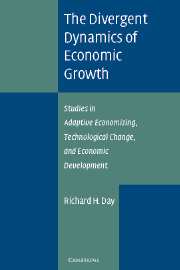 The Divergent Dynamics of Economic Growth
The Divergent Dynamics of Economic Growth Book contents
- Frontmatter
- Contents
- Preface
- Acknowledgments and Comments
- 1 The Adaptive, Evolutionary Theory of Divergent Economic Growth
- PART ONE GLOBAL TRENDS AND ADAPTIVE ECONOMICS
- PART TWO TECHNOLOGICAL CHANGE IN AGRICULTURE AND INDUSTRY
- 4 The Economics of Technological Change and the Demise of the Sharecropper
- 5 Economic Development as an Adaptive Process
- 6 Industrial Development and Technological Change
- 7 An Adaptive Economizing Analysis of Chinese Enterprises Under Alternative Reform Regimes
- PART THREE EPOCHAL DEVELOPMENT
- PART FOUR TOWARD A GENERAL THEORY OF DEVELOPMENT
- Index
5 - Economic Development as an Adaptive Process
A Green Revolution Case Study
Published online by Cambridge University Press: 08 August 2009
- Frontmatter
- Contents
- Preface
- Acknowledgments and Comments
- 1 The Adaptive, Evolutionary Theory of Divergent Economic Growth
- PART ONE GLOBAL TRENDS AND ADAPTIVE ECONOMICS
- PART TWO TECHNOLOGICAL CHANGE IN AGRICULTURE AND INDUSTRY
- 4 The Economics of Technological Change and the Demise of the Sharecropper
- 5 Economic Development as an Adaptive Process
- 6 Industrial Development and Technological Change
- 7 An Adaptive Economizing Analysis of Chinese Enterprises Under Alternative Reform Regimes
- PART THREE EPOCHAL DEVELOPMENT
- PART FOUR TOWARD A GENERAL THEORY OF DEVELOPMENT
- Index
Summary
Introduction
Only a short while ago it was commonplace for the most distinguished social scientists to regard peasants in the less developed agricultures as bound by culture to traditional agricultural practices, unable or unwilling to respond to commercial development. During the past decade a quite different view has all but replaced this position: A series of econometric investigations has confirmed T. W. Schultz's contention that traditional patterns are maintained because peasant farmers are economic people in the same sense as their Western counterparts and, faced with economic incentives, will respond in a manner predicted by economic theory.
Our own work on agricultural development in the less developed countries began with a case study of the Indian Punjab. We commenced this study with an extensive tour through the region, tramping through villages and farms, interviewing farmers, and discussing agriculture with experts at Punjab Agricultural University and in the state and federal governments. These direct observations and in-depth interviews, augmented by a survey of secondary statistics, revealed a state in rapid transition from age-old production methods to modern technology, a rapid growth in farm output, and a drastic change in the seasonal work pattern of farmers. The transformation has clearly involved extensive investments and the substitution of capital for labor as various individual tasks were being mechanized and as wholly new methods and materials were being adopted.
- Type
- Chapter
- Information
- The Divergent Dynamics of Economic GrowthStudies in Adaptive Economizing, Technological Change, and Economic Development, pp. 79 - 96Publisher: Cambridge University PressPrint publication year: 2003
